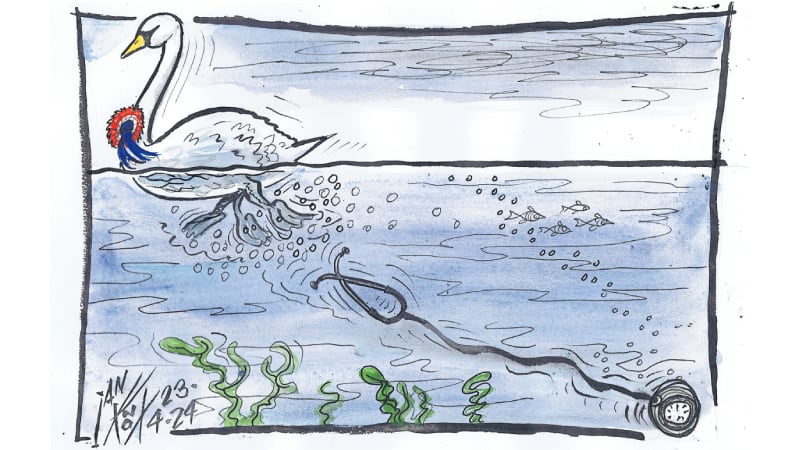At times ne wonders at the capacity for unionist politicians to keep digging holes for themselves, which unhappily means the resultant ‘spoil’ falls on the rest of us as well. In the long run, the DUP self-inflicted wound, the Northern Ireland Protocol row will produce some sort of fudged face-saving formulation. In the short run one hopes that threats of violence remain just that and it does not take the death of an innocent Catholic to calm things down.
The Irish Sea border is here to stay and it is not hard to envisage a simple solution and just move all those paper-checking jobs from Larne to Britain. We all know Sir Jeffrey Donaldson could live with the loss of 40,000 jobs but does the DUP really want to gift even a few more jobs to ports on the other side of the Irish Sea? It is not as if there are not examples of such arrangements already –the US operates a passport control facility at Dublin Airport and something similar used to, and presumably still will, operate at both ends of the Eurostar tracks.
The not-so-good ship Brexit has sailed, in just the same way all those new ferries now sail around Britain, never to return to Stranraer, Holyhead and other ports east and west. In broad terms the law of large numbers will inevitably hit east-west trade. In the past I well remember frustration at all sorts of competitions, sale promotions and initiatives with small print specifically excluding Northern Ireland. It seems likely those clauses will return.
Speaking of numbers the end of the Apartheid regime in South Africa came very quickly. As international opprobrium grew, company CEOs had a ready response for De Klerk to the question: Should multi-national companies continue to trade in South Africa? When the extra sales were less than 1 per cent and the increased profits lower still, was balanced against sales and profits lost elsewhere, the answer was brutally clear. Similarly Northern Ireland, with a market of 1.8m, will increasingly not be worth the hassle for companies big and small.
As a final thought, the sad and bitter irony is that Larne once had a business model to establish itself as the freight gateway to the whole of Ireland.
To think Larne’s business case has been undermined by its local MP is nothing short of tragic. Unfortunately, it seems there is no De Klerk figure in unionism, yet.
FRANK HENNESSEY
Belfast BT9
Clear example of ‘taking back control’
Evidence produced by the market research firm Statista offers a damning indictment of the vaccine roll out by the European Union. By the end of January, the number of vaccination doses per 100 for each member state (including Ireland) averages 2-3 per cent. The United Kingdom, by contrast, has vaccinated 10 per cent of its population. Northern Ireland has nearly 9 per cent of its population vaccinated.
Central to this success has been the UK’s departure from the European Union. Supporters of Brexit say this is a clear, transparent example of what is meant by ‘taking back control’. The inefficient and bureaucratic manner which has bedevilled other member states, coupled with media reports of threats to blockade supply chains to the UK, has only affirmed the belief of many that leaving the EU was the correct decision in hindsight.
It is alleged, by former Ambassador Ray Bassett, the Irish government’s attempts to purchase the AstraZeneca vaccine were blocked by the European Commission. If this is true, it is another example of the totalitarian nature of the European Union, sending a message that the interests of the European project comes before saving lives.
Unionism has been challenged in the past to demonstrate the benefits of being part of the United Kingdom. The onus is now on nationalism to explain why we would be better off as part of the European Union.
ADRIAN LONERGAN
Belfast BT7
Special needs children being ignored
As a parent of a child with special needs, I had the means to navigate the broken system and ultimately go private to obtain a diagnosis for my child. But I despair at the reality for all those parents of children with special educational needs, staring into the black hole of our statutory assessment system. These families are being failed daily due to our Education Authority turning down statutory assessment for children, even though they have extreme learning difficulties.
Our health system, broken. Pre-pandemic waiting lists stood at two-plus years for ASD and ADHD assessments. Even with a diagnosis there is still little to no support. Parents are left to fend for themselves. Schools doing their best to fill the voids. We are sitting on a ticking time bomb of mental health and lost potential. When will politicians wake up to the crisis and support our SEN children, parents and schools?
BRENDA HASSETT
Lisburn, Co Antrim







